#marginalized
Text
with how we're all aware of how toxic masculinity leads men/boys to harass, assault, and abuse other men/boys, you'd think the fact they can be harmed by patriarchy and misogyny wouldn't be a controversial statment. *especially* marginalized men. but alas, many people have taken the "identity" in identity politics so literally, they just end up ignoring and reinforcing the harmful things they claim to be against.
also if you think the pain of the men harmed by toxic masculinity isn't a big deal because they're men... that is. that is literally you believing in toxic masculinity. like i thought we all knew part of toxic masculinity is that men shouldn't feel pain, they shouldn't cry, they can't ask for help or be truly hurt, etc. etc. and if they do any of these things, then they're not real men and not only deserve to be emasculated, but deserve to suffer. you just switched it to they are real men so they deserve to suffer.
and even though again, this is extra harmful for marginalized men, i shouldn't have to say that for you to care. if you only give support to people harmed by these systems when you think deserve it, you're always going to end up propping these systems up at some point. maybe you should stop that.
also. to any man reading this who feels like their pain doesn't matter: it does. you deserve to exist in a world where you're safe to be yourself and feel emotions, and get genuine protection and support. we all need to exist in that world. none of us deserve this hell.
#ifairy#mens health#mens mental health#patriarchy#misogyny#anti patriarchy#feminism#feminist#intersectional feminist#marginalization#marginalized#queer man#trans man#gay man#lgbt man#gay men#trans men#lgbt men#queer feminism#identity politics#men#toxic masculinity#masculinity#gender essentialism
1K notes
·
View notes
Text

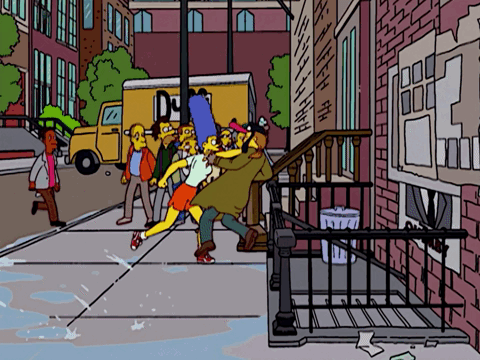
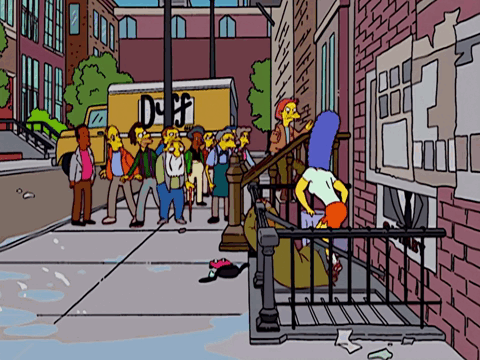
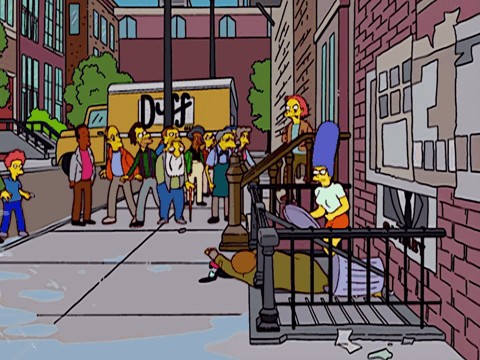
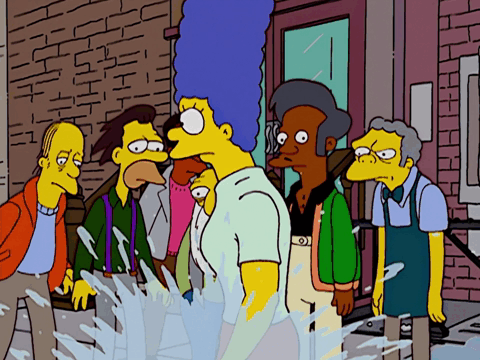
641 notes
·
View notes
Text
. . . but I see how little people care. Somehow my story doesn't interest them.
Siri Hustvedt, from The Blazing World
#uninterested#rejection#marginalized#ignored#unloved#unlistened to#silenced#quotes#lit#words#excerpts#quote#literature#the worst feeling#personal#siri hustvedt#the blazing world
199 notes
·
View notes
Text
"I think she was just a sick old lady who was no use to anyone and smelled a bit and looked odd because she had no teeth," said Tiffany. "She just looked like a witch in a story. Anyone with half a mind could see that."
Miss Tick sighed. "Yes. But sometimes it's so hard to find half a mind when you need one."
Terry Pratchett, The Wee Free Men
#tiffany aching#miss tick#the wee free men#discworld#terry pratchett#witches#perception#fact#appearances#marginalized#stories#half a mind#hard to find#where's half a brain when you need one
273 notes
·
View notes
Text
Queer Witch’s Manifesto 2.0 (2023)
(Written in 2021 originally sourced from another manifesto online, this was adjusted for my own needs back then, now updated again to better fit the needs of 2023 and so forth. Finished this edit up for the Full Super Sturgeon Moon of Aug 1st ~ 3rd 2023, as I re-investigated my life’s values and what made up who I am for my 32nd solar return on July 24th. Enjoy. If this echoes true with you, you are allowed to use this manifesto for yourself too. It is open and free to use and change as you need. Take care.
-O)
----
There are INFINITE genders or lack thereof and sexual identities.
Each one deserves the same space and respect as the next.
Each one brings something unique and necessary to a circle
should they choose to share their magic with us.
We are not limited by binarism.
White supremacy upholds ideals and expectations that harm EVERYONE and must fall.
Christo-fascists seek out only furthering this harm in our communities.
We must NOT let it continue.
Even though white supremacy harms everyone, white people must not center themselves in discussions or plans for taking it down.
We must center the voices of those most marginalized by white supremacy first and foremost
Because we are fighting white supremacy, queer magicians must work hard not to appropriate sacred religious tools, artifacts, aesthetics, practices, or deities that do not belong to us.
Sex magic is powerful, beautiful, and queer. It should not be censored.
Like anything sexual, we must hold up the idea that informed and enthusiastic consent is mandatory.
Our queered-up version of sex magic also fights rape culture, patriarchy,
heteronormativity, and cisnormativity.
Though we are anti-capitalist we recognize the constraints of the society we live in and know that money magic is often critical and empowering for those living in the margins.
We recognize that the Goddess does not equal “womb worship”
and that ANYONE can invoke “Goddess energy.”
Goddess energy is intersectional.
We recognize that some witches may have physical, emotional, or mental limits that cannot be overcome with spirituality. We welcome these witches to bring their whole, real and authentic selves into a magical space and cast spells in a way that works best for them.
Magic is not diminished by disability.
Disabled witchcraft is powerful, immeasurably so.
All bodies are capable and deserving of magic and joy in their lives.
We recognize that individual traumas may need to be healed before we move on to collective work.
Global climate change is killing us all and we MUST protect and heal the Earth.
Hierarchies do not work in a queer magical context. We are equals even if our jobs differ.
MAGIC IS A TOOL FOR PERSONAL HEALING THAT LEADS TO EMPOWERMENT.
This empowerment enables us to focus on social progress, empowering others, and collective liberation.
#manifesto#queer witch manifesto#queer witch#queer#witchcraft#queer witchcraft#lgbtq#lgbtq witchcraft#lgbtq witch#marginalized witchcraft#witch#marginalized#social justice#leftist#leftism#leftist witch#pagan#religion#tumblr witches#witch manifesto#personal manifesto#life#values
21 notes
·
View notes
Text

#Seerut Chawla#vulnerable#marginalized#cancel culture#institutional power#institutional capture#ideological capture#religion is a mental illness
14 notes
·
View notes
Text
MARGINALIZED
My focus recently has been on my marginalization as a gay, divorced, single man in the Church of Jesus Christ of Latter-Day Saints. I had an insight last week as I studied scriptures and pondered and prayed about marginalization in general.
What does it mean if someone is marginalized?
Today, marginalize refers to the act of treating a person or group as though they are insignificant by isolating and/or disempowering them. The term marginalized applies to the person or group that is treated insignificantly, pushed to the margins of society and rendered powerless. Marginalization is the result of discrimination. Discrimination exists in many forms, such as racism, sexism, ableism, ageism, homophobia and xenophobia. Whether or not the discrimination is overt or covert, it marginalizes others and that is unacceptable.
As I thought about that some insights came to mind.
I was a small child marginalized in many ways. I was a Highly Sensitive Person in a family that did not like a HSP boy. I had a father who wanted a boy like his ideal, the man he never was. I grew up early, knowing I was not acceptable, something was wrong in me. I lived in the ghetto of a small Midwestern town. That side of town was regarded as trash. Child abuse was common and just part of life. We did not know any different. I went into a profession, Registered Nurse, dominated by females. Once again, I was marginalized as a "male nurse." When I was 13, I understood I was attracted to my male friends. I knew that was wrong and I felt so different and so alone and so marginalized. After I joined the LDS church, I accepted that my sexual orientation was a sin that would result in eternal punishment, and I fought against it so hard. I got married, had children and grandchildren and tried to be happy. I was on the outer edge, and I was a man divided against himself.
As I think about the members of my ward and the many good people who pursue being good, I wonder how many of them are marginalized in some aspect. Maybe they all fall into some marginalized group.
LBGTQA+ and allies
People of color
People of African American descent with family history of slavery
People of religious groups who may not be in favor for various reasons, Jews, Hindus, Buddhists, Mormons, Catholics, Jehovah Witnesses, Snake Baptists, Holy Rollers, Whirlimng Dervishes, etc. etc.
People raised in the wrong part of town.
Single parents, Orphans, Adoptees, Adopted parents, childless parents,
Shamed, self-loathers, want to be someone else’s,
People who project onto others, those projected on, those who use transference to defend themselves,
Married people, teen-agers, pre-teenagers,
People who went to schools that were not the best, community colleges, virtual colleges, home schooled, schools dominated by non-white races.
Latino people, pickers, illegal aliens, people with foreign accents that are not desirable,
People with everyday jobs, housekeepers, hotel cleaners, waiters and waitresses, sewer workers, garbage collectors, used car salesman, scammers, phone solicitors.
People with smelly homes, broken down porches with appliances and furniture on them, uncared for yards.
People with dirty children in bare feet and dirty clothes
Appalachians, hillbillys, southerners, racists, bigots, nazis, KKK, Haters,
women, girls,
Fat people, people with glasses, ugly people, people who spit in public,
Bullies, fighters, controllers, get their wayers
Abusers, sexual, emotional, physical abusers, their victims their survivors
Criminals, jail birds, cons, ex-cons, police, fireman, law enforcement
Lawyers, doctors, nurses,
Republicans, Democrats, Conservatives, Liberals, Communists, Fascists, Libertarians
Rich people, people with no worries or cares or need to help.
People of privilege who can have everything they want.
People who like snakes and lizards
People with odd looking hair, dyed or long or wild or standing up or part shaved, or all shaved or just different
People who are animals, dogs, cats, deer, pigs
People from Poland, Russia, Mexico, China, Asia, people with slanty eyes, with red dots on their foreheads, Muslims, people with turbans, women covered with burkas,
Blondes, especially female
Single people, unmarried, divorced, windowed,
People addicted to drugs, alcohol, pornography, sex, working out,
Lovers of fame, fortune, liars, thieves, politicians,
Heart breakers, non- committers, seducers, pedophiles, enticers, embracers, touchers, feelers,
Homeless people, beggars, street people, shopping cart people.
Atheists, Agnostics, God haters and profaners,
People who believe they are saved, condemners, better than thouers, people who know it all, prideful people.
Have I left anybody out? Or have I failed to insult you or the group you align yourself with? Or the group you want to forget you ever were a part of? Or the group you are happy to be a part of and do not appreciate being lumped into here?
I also fear that we will compare who has it worse. I say that each situation, whether of our making or by our birth or others’ choices, are legitimate. I have heard or read of thousands who had it worse than me. It did not take away my issues and what I go through. Your trials and tribulations and joys are yours and deserve the same reverence and respect of all others.
These words cannot define or describe the people they may represent. They cannot be equal in their results or effects. First there is the person who experiences these words in their lives. Each is different and unique and deals with a myriad of ways.. Some can turn these experiences into stellar personality adaptations. The environment that you grow up in and the attitudes of those who influence you can change the effect of these situations. They can become a reason to overcome or a reason to despair. Your faith can change how you view life, and its' vagaries can change the outcomes. The options you have or the perceived options you have can change how you react to all situations. The intensity of the experience and its effects on you can vary greatly. It is true that some of these are a result of things you cannot control or change. Others have the potential to be choices that you can control or change. But to some degree we all have traits or situations that others judge, feel superior to or dislike enough to not want to acknowledge your worth or value. If we examine ourselves, we will find we are both victims of and people who sometimes, marginalize others.
My question is how any of us can feel superior or look down on anyone else, when we are all in some way marginalized people?
I am a strong believer in Heavenly Father and Mother and my Savior Jesus Christ. I attest that he made all of us, everyone on the lists above. He loves us fully and completely as we are. He wants us to be better, but He loves us with our faults and offers a way back home to His side. Many of the people I listed above are people that I am either a part of or have judged in my life. I seek to be a better man, a better queer man, a better Christ-like man by realizing that the people at church and in my social sphere that marginalize me are themselves marginalized in some capacity. My goal is to help us all see that and accept that we can love one another because we are different and we have incredible stories and incredible pasts and that we can all become more loving, accepting and affirming.
8 notes
·
View notes
Text
¡ URGENT !
Acacia is in urgent need of funds by this coming Friday February 2, to be able to stay housed.
❤️🩹 raised so far $345 / $2,850 => $2,505 remaining <= they have just 3 days to raise $2,505 ! . ❤️🩹
Context: Because of Acacia's complex and extensive accessibility needs, suitable living spaces are extraordinarily rare; 99.99999% of the property market is completely inaccessible, and any accessible properties usually have a higher-than-average monthly rent ( which is part of why they've been unhoused for so long ).
They moved into this property just two weeks ago after never having a safe, stable, accessible place to live that meets their complex needs, and after fighting every day for their survival, all alone, while severely marginalized and extremely vulnerable, for over a decade.
This is the first time they've been safe, had a home, had stability, been comfortable, and had their complex array of accessibility needs met.
They need to be able to stay here so they can stay housed, rest and recover from the extensive harm they've endured, generate income and serve their peers.
❤️🩹
Acacia shall reach their goal if:
5 people donate $500 10 people donate $250 25 people donate $100 50 people donate $50
by Friday February 2
❤️🩹
HOW TO DONATE Ko-Fi: https://ko-fi.com/care4acacia PayPal: https://paypal.me/mxpapaya
Include "housing" in the message.
No donation is too small. All donations of all sizes welcome.
❤️🩹
~~~~~~~~~~~~~
Care for Acacia is a collaborative project between vulnerable peer-in-need Acacia and peer supporter Asa'.
The aim of the project is to meet Acacia's most basic and essential needs, provide them with a baseline quality of life, create a pathway out of poverty, and build the foundations they need to generate their own income.
Acacia is very severely marginalized and extremely vulnerable. Their life has been a daily fight for survival in poverty, alone, navigating violence, in a perpetual and desperate search for safety, community and belonging.
Acacia is in great need of the care, love and support of their communities and to have their most basic and essential needs met. Let's give Acacia the care and quality of life they deserve.
Together we thrive ... one act of community care at a time ❤️🩹
~~~~~~~~~~~~~~~~~
Due to Acacia's high support needs and burnout, this blog is ran by an anonymous volunteer on Acacia's behalf.
#neurodiverse stuff#its the neurodivergency#marginalized#marginalized people#marginalizedcommunities#marginalized groups#genderqueer#adhd#actually adhd#actually mentally ill#ptsd#complex ptsd#cptsd#actually cptsd#actually chronically ill#chronic disease#dissociation#actually dissociative#actually disordered#burnout#burned out#immune compromised#immunocompromised#oppressed#invisible#audhd#actually audhd#adhd problems
3 notes
·
View notes
Text
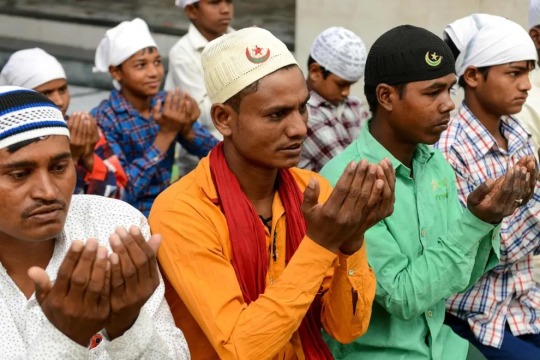
Sana Shayin, a third-year student studying international relations at King's College London, has been exposed to a lively and thought-provoking atmosphere on a regular basis. Her passions for human rights advocacy and diplomacy have grown throughout this degree. Given the current and rapidly changing political landscape of the region, she is thrilled to be a part of International Relations Today as the Editor for South and Central Asia and contribute to the academic discourse in the field.
India is home to about 200 million Muslims, making it one of the world's largest Muslim populations, despite being a minority in the nation that is predominantly Hindi. Despite constitutional protections, Indian Muslims frequently experience violence, intolerance and discrimination since the country’s independence in 1947.
Experts claim that anti-Muslim sentiment has surged since Prime Minister Narendra Modi and the ruling Bharatiya Janata Party (BJP) came to power in 2014 and began promoting a Hindu nationalist agenda. The government has enacted divisive policies that opponents claim will disenfranchise millions of Muslims and blatantly disregard their rights since Modi was reelected in 2019. Since Modi assumed office, there has been a rise in violence against Muslims. The acts have sparked protests in India and drawn criticism from all around the world. According to several analysts covering India, Modi’s reelection in 2024 would probably increase religious conflict in the nation.
The Demographics
India is a diverse nation in terms of religion, ethnicity, and language. The majority of its Muslims, who identify as Sunnis, make up roughly 15% of the population, making them by far the largest minority group. Hindus make up about 80% of the population. Similar to the Hindu population, the Muslim population in the country is diverse, with differences in caste, ethnicity, language, and access to political and economic power.
Partition's Impact on Hindu-Muslim Relations
Scholars claim that the animosity between Muslims and Hindus in India stems in part from the 1947 partition of British India and the schisms that happened during the British colonial era. The British decided to abandon the subcontinent after World War II because their economy was destroyed and they could no longer maintain their empire. Before the country was divided, Jawaharlal Nehru and Mahatma Gandhi led the Indian National Congress in organizing massive protests and acts of civil disobedience against the British government in an effort to gain independence. Muhammad Ali Jinnah’s political organisation, the All India Muslims League, demanded a separate state for Muslims.
In 1947, a British judge arbitrarily drew the boundaries between a Hindu-majority India and a Muslim-majority Pakistan, which included what is now Bangladesh. The Partition resulted in widespread migrations of Muslims to Pakistan and Hindus and Sikhs to India, as well as deadly riots and horrifying intercommunal violence. Survivors remember villages burning to the rubble, dead tossed in the streets, and blood-soaked trains transporting refugees from one nation to another. Historians estimate that between 200,000 and 500,000 people died.
It is unclear why groups of people who had lived together for hundreds of years fought one another. The British "divide-and-rule" policy, which gave the Muslim minority—roughly 25% of the population—some electoral advantages, has drawn criticism from some analysts. Others highlight disputes between political movements that organized followers of the Muslim and Hindu faiths. Nearly 35 million Muslims still lived in India after Partition.
The Religion Factor
The nation’s 75-year-old constitution upholds egalitarian values such as nondiscrimination and socioeconomic equality. The Constitution does not specifically require the separation of church and state, despite the word "secular" being added to the preamble in 1976. Congress party leaders who fought for
India’s independence promoted a country that treated all its people equally, regardless of their religious beliefs. Gandhi, who championed a unified India free from discrimination, was assassinated by Nathuram Godse, a Hindi nationalist, in 1948. The first prime minister of India, Nehru, considered the greatest threat to the country as those seeking to split the country along religious lines, particularly among Hindu factions. He felt that secularism was necessary to create a harmonious society and prevent another tragedy similar to what happened after Partition. Hindu nationalists contend that since Hindus’ sacred territories are inside India, whereas Christian and Muslim holy territories are outside, Hindus are the “true sons of the soil.” Generally speaking, they support laws meant to convert India into a Hindu state. Even though the majority of Indian Muslims are sprung from Hindus who converted to Islam, many regard them as foreigners. Founded in 1980, the BJP traces its origins to the political wing of the Rashtriya Swayamsevak Sangh (RSS), a Hindu nationalist paramilitary volunteer group.
The BJP secured a single-party majority in the Lok Sabha—India’s lower house of parliament and most powerful political body—for the first time in 2014, electing party leader Narendra Modi as Prime Minister. In 2019, the party won a majority once more following a contentious campaign packed with anti-Muslim rhetoric.
What type of discrimination do Indian Muslims face?
Muslims have faced prejudice in the workplace, in the classroom, and in housing. Many face obstacles in their pursuit of riches, political influence, and limited access to essential services, including healthcare. Furthermore, even with constitutional protections, people frequently have difficulty obtaining justice after being the target of prejudice. Muslims’ presence in parliament has stagnated over the past 20 years; following the 2019 elections, they controlled only 5% of the seats. This is partially because of the BJP’s ascent; by the middle of 2022, the party had zero Muslim Members of Parliament. In the meantime, a 2019 report by the NGO Common Cause, situated in India, discovered that half of the police polled exhibited anti-Muslim prejudice, which decreased their likelihood of stepping in to prevent crimes against Muslims. Analysts have also noted widespread impunity for those who attack Muslims. Recently, state and national courts and government bodies have often reversed convictions or dropped prosecutions against Hindus accused of participating in violence against Muslims. States are passing more and more legislation that limits the religious freedoms of Muslims, such as laws that forbid wearing headscarves in public places and prohibit conversion.
Additionally, in a move critics refer to as “bulldozer justice,” authorities have punished Muslims extrajudicially. Authorities in multiple states demolished people’s homes in 2022, claiming the buildings didn’t have the necessary permits. Critics countered that they mainly targeted Muslims, some of whom had recently taken part in demonstrations. Although the practice has persisted, India’s Supreme Court responded by ruling that demolitions “cannot be retaliatory.”
What controversial policies has the Modi government imposed on Muslims?
The Citizenship Amendment Act was passed by the parliament in December 2019 and signed by Modi. It permits Hindu, Sikh, Buddhist, Jain, Parsi, and Christian migrants from Afghanistan, Bangladesh, and Pakistan to obtain citizenship more quickly. Critics claim that because the law excludes Muslims and applies a religious standard to citizenship for the first time, it is discriminatory. The Modi government claims that the law was made to protect these three countries' mostly Muslim vulnerable religious minorities from persecution.
Simultaneously, the BJP pledged to finish the National Register of Citizens (NRC) in its 2019 election manifesto. The NRC was created in the 1950s
specifically for the state of Assam in order to determine whether the residents of that state were immigrants from what is now Bangladesh's neighbor or Indian citizens. The Assam government revised its registry in 2019, leaving out about two million Bengali Hindus and Muslims. Assume that this process is implemented across the nation. Critics contend that in that scenario, a sizable Muslim population might become stateless because they lack the necessary documentation and are not qualified for the Citizenship Amendment Act's expedited citizenship process.
Meanwhile, Jammu and Kashmir, the only Muslim-majority state in India, has seen its political stature eroded under Modi. The state, located in the mountainous border region under dispute with Pakistan, was divided into two parts and its special constitutional authority was taken away by the government in August 2019. Since then, Indian authorities have repressed the people’s rights in the area, frequently in the name of preserving security. In 2021, they detained well-known political figures and activists, harassed and arrested journalists, and shut down the internet 85 times. The government maintains that security has improved, yet since the division, armed groups have killed dozens of civilians. In December 2023, the Supreme Court, upholding the government’s decision, ruled that the territory should regain statehood in time for local elections the following year.
"Muslims' status will change more the longer Hindu nationalists are in power, and it will be harder to reverse such changes," says Ashutosh Varshney, a Brown University expert on Indian intercommunal conflict.
Maintaining India's Secularism
Although there is an increase in anti-Muslim sentiment among Hindus, experts say it is wrong to assume that all Hindus and BJP supporters are against Muslims. Muslims and Hindus have resisted the BJP's attempts to weaken secularism in India in the form of activists, law scholars, and students. For instance, following the passage of the Citizenship Amendment Act, some state chief ministers declared they would not carry out the law, and about 2,000 academics and professionals signed a declaration condemning it for violating the spirit of the Constitution.
Global Reactions
Numerous foreign governments and international organizations have denounced the BJP's discriminatory policies towards Muslims, highlighting specific concerns with the Citizenship Amendment Act, the BJP's actions in Kashmir, and anti-Muslim rhetoric. The UN human rights office described the Citizenship Amendment Act as “fundamentally discriminatory.” Iran, Kuwait, and Qatar were among the Muslim-majority countries to file formal complaints against India in 2022 over public officials’ Islamophobic remarks. The Organisation of Islamic Cooperation (OIC), comprising fifty-seven member states, has demanded that India cease the “systematic practices against Indian Muslims” and the “growing spate of hatred and defamation of Islam.” Nevertheless, Modi has succeeded in deepening India’s relations with the Gulf countries dominated by Muslims, including the United Arab Emirates, where he presided over an event for Indian expats and dedicated a brand-new Hindu temple in Abu Dhabi.
Since they have strengthened ties with India, successive U.S. administrations have been hesitant to denounce the country’s atrocities openly. For instance, in February 2020, President Donald Trump visited India and complimented Prime Minister Narendra Modi on his support for religious liberty while remaining silent on the violence that had broken out in Delhi. Instead of openly criticizing the BJP government or Modi, the Joe Biden administration has opted to strengthen the strategic partnership between India and the United States. It is believed that Biden has privately voiced concerns about human rights.
India, however, received its lowest ranking of “country of particular concern” in the 2020 report from the independent U.S. Commission on International Religious Freedom—a designation it has held since 2004.
The most recent reports have upheld that classification and pushed for the US government to impose sanctions on Indian officials who are accountable for mistreatment. Some members of Congress have also expressed concerns.
3 notes
·
View notes
Text
Fashioning Consciousness: How Hip-Hop Influences Political Thought
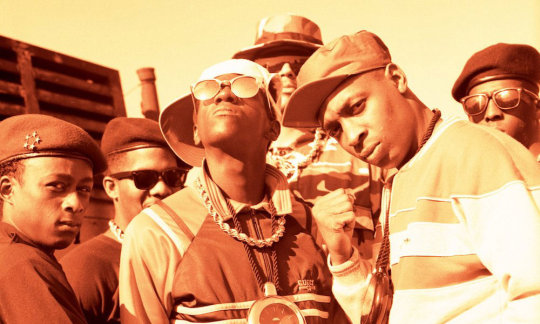
Introduction:
Welcome to our blog, where we explore the intersection of fashion, culture, and social consciousness. In this post, we delve into the captivating relationship between hip-hop and political thought. Hip-hop, as a powerful form of artistic expression, has long served as a platform for artists to voice their political views, shed light on social issues, and challenge the status quo. Join us as we embark on a journey to understand how hip-hop influences political thoughts, shaping conversations, and inspiring change through its influential presence in the fashion world.
A Catalyst for Social Commentary:
Hip-hop has consistently pushed boundaries and sparked conversations about political and social issues. From its early origins in marginalized communities, hip-hop artists have used their platform to shed light on racial inequality, police brutality, economic disparities, and other pressing concerns. Through their lyrics, fashion choices, and overall style, they challenge the status quo and offer a unique perspective on the world.
Artistic Expression as Political Resistance:
Hip-hop culture embodies a spirit of resistance against systemic oppression. Artists often use their music, fashion, and visual imagery to critique existing power structures and advocate for change. Fashion within the hip-hop community becomes a tool for self-expression, allowing individuals to challenge stereotypes, assert their identity, and make powerful political statements.
Hip-Hop Fashion: A Visual Language of Protest:
Hip-hop fashion is not just about style; it is a visual language that communicates political and social messages. From bold graphic tees to statement accessories, hip-hop clothing often incorporates symbols, slogans, and imagery that reflect resistance and activism. Artists and individuals within the hip-hop community use fashion as a means to visually express their political beliefs and ignite conversations.
Influence on Voter Engagement:
Hip-hop's influence extends beyond fashion and music; it has a profound impact on voter engagement and political activism. Artists have used their platforms to encourage voter registration, promote civic participation, and advocate for social justice causes. Hip-hop's connection to political thought has motivated young people, who are often the primary consumers of hip-hop culture, to become more politically aware and active.
The Power of Narratives and Storytelling:
Hip-hop has a unique ability to convey personal narratives and amplify marginalized voices. Artists use storytelling to share their experiences and shed light on the socio-political issues affecting their communities. By humanizing these stories, hip-hop challenges stereotypes and fosters empathy, creating a deeper understanding of the political struggles faced by marginalized populations.
Building Community and Social Movements:
Hip-hop has played a pivotal role in community building and the formation of social movements. Through collaborations, events, and grassroots initiatives, artists and fashion brands within the hip-hop sphere have united communities, amplified voices, and initiated positive change. Hip-hop fashion becomes a symbol of unity, solidarity, and collective action.
Conclusion:
Hip-hop's influence on political thought is undeniable. Through fashion, music, and cultural expression, hip-hop artists have become powerful advocates for social and political change. By embracing their platform, they challenge systemic inequalities, amplify marginalized voices, and inspire individuals to question and engage with political issues. Hip-hop fashion serves as a visual medium for political resistance and self-expression, allowing individuals to make bold statements and contribute to the broader conversation surrounding social justice. So, as you explore hip-hop clothing and embrace its unique style, remember the deep-rooted political legacy that accompanies it, and let your fashion choices become a symbol of conscious awareness and a catalyst for positive transformation.
#HipHopPolitics#PoliticsOfHipHop#Hip Hop Artists#Political Change#Politics#Marginalized#Resistance#Social Movements#Hip Hop Influence#Voter Engagement#Protest#Hip-Hop Community#Social Commentary#Inspiring Change#Political Views#Social Issues
5 notes
·
View notes
Text
We people at the bottom feel everything; but it is hard for us to speak out our hearts. our thoughts float about in us. we are ashamed because, although we understand, we are not able to express them; an often from shame we are angry at our thoughts.
Maxim Gorky, Mother, 1906
#maxim gorky#mother#russian literature#thoughts#marginalized#oppressed#anger#quotation#tumblr#text#books and libraries#writing#literature#quotes#novel#literary text#world literature
57 notes
·
View notes
Text
privilege is something bestowed upon you by an outside force; it's not something to feel guilty for. you can't control how other people treat you. but using that privilege to help others is something you do have power over.
that means taking that privilege and not just turning it into a weapon against oppression, but into a tool to support those harmed. you have the power to speak up and take action. you have the power to uplift the voices of people facing oppression. you even have the power to step back and take care of yourself, which allows you to better help others.
that kind of power isn't something to feel guilty over. and even when you're wrong, guilt helps no one. it just makes you feel bad. it can drive you to make other people carry the burden of your guilt. it harms your ability to be there for others, and the cause at large.
lay down the guilt, pick up your power, and use it to make all of our lives better. mind you, that includes your own; when marginalized people are free, all of us are.
21 notes
·
View notes
Link

In honor of Neurodiversity Awareness Month, we [itch.io] are teaming up with the amazing folks at Diversity Saves - a 501(c)(3) committed to the promotion and uplifting of LGBTQ+, BIPOC, Neurodiverse, Disabled, and other marginalized communities in the tabletop roleplaying game industry - to raise funds for grants to Marginalized Creators in the TTRPG space!
This bundle contains over 100 games and game supplements generously donated to help raise funds for Diversity Saves from more than 50 creators including many Neurodivergent and Autistic creators.
Buy 104 items for $5 Regularly ~$387 Save 98%! 100% of proceeds from this fundraiser will go to Diversity Saves and their efforts to increase diversity and inclusion in TTRPGs.
You can learn more on their website at https://www.diversitysaves.org!
#Diversity Saves#neurodiversity#charity fundraiser#itch.io#itch.io bundle#Neurodiversity Awareness Month#Neurodiversity Acceptance Month#autism awareness month#autism acceptance month#charity#fundraiser#TTRPG#lgbtq+#bipoc#neurodiverse#disabled#marginalized#tabletop roleplaying games#inclusion#bundle
4 notes
·
View notes
Text
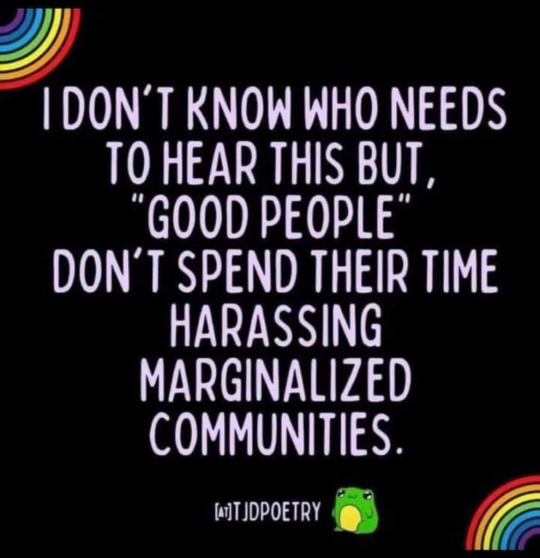
I don’t know who needs to hear this but, “good people” don’t spend their time harassing marginalized communities. -TJDPOETRY
#pride#marginalized#community#communities#LGBTQIA#rainbow#frog#prejudice#discrimination#acceptance#tolerance#bigotry
3 notes
·
View notes
Text
Taylor Swift's Gay Moments: evermore ~ It's time to go
it’s time to go
Or that moment again, he’s insisting that friends/Look at each other like that…/…That old familiar body ache/The snaps from the same little breaks in your soul/You know when it’s time to go
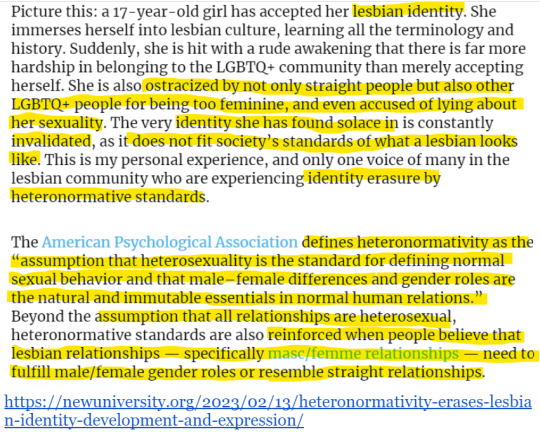
View On WordPress
#assumptions#bias#bisexual#butch#erasure#Evermore#female#feminine#feminism#femme#gay#Gaylor#heteronormative#heterosexist#it&039;s time to go#lesbian#lesbian-invisibility#LGBT#marginalized#men#misogyny#representation#research#sapphic#science#sexuality#stereotypes#Taylor Swift#WLW#women
3 notes
·
View notes
Text
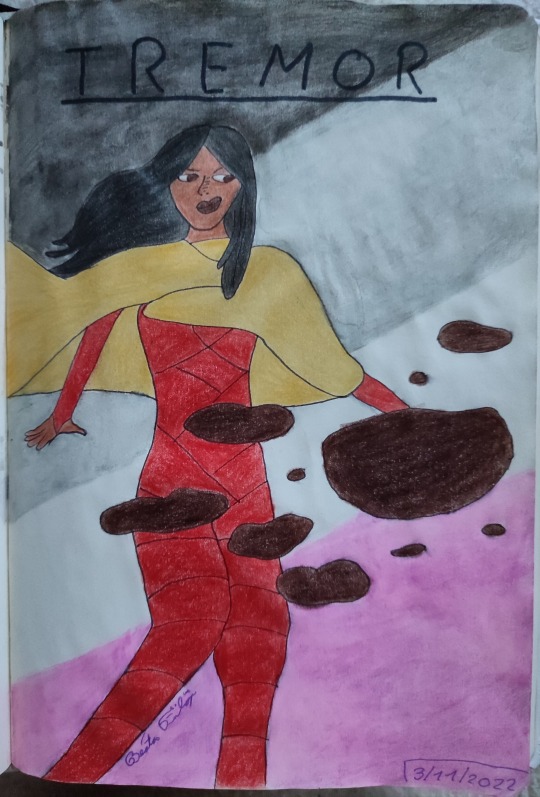
Fun story, this. After I reblogged yesterday that art of Tremor, complaining that there isn’t nearly as much of it as I would like, I realized that it is actually perfectly within my power to change this.
So, here is my own Roshanna Chatterji appreciation drawing.
#she deserves so much more recognition#the entire Movement does#they were what a suuperhero group should be#diverse#marginalized#standing up for others who need their protection#comics#The Movement#Roshanna Chatterji#tremor#superheroes#DC comics#asexual character#asexual pride#Fanart#my art
10 notes
·
View notes